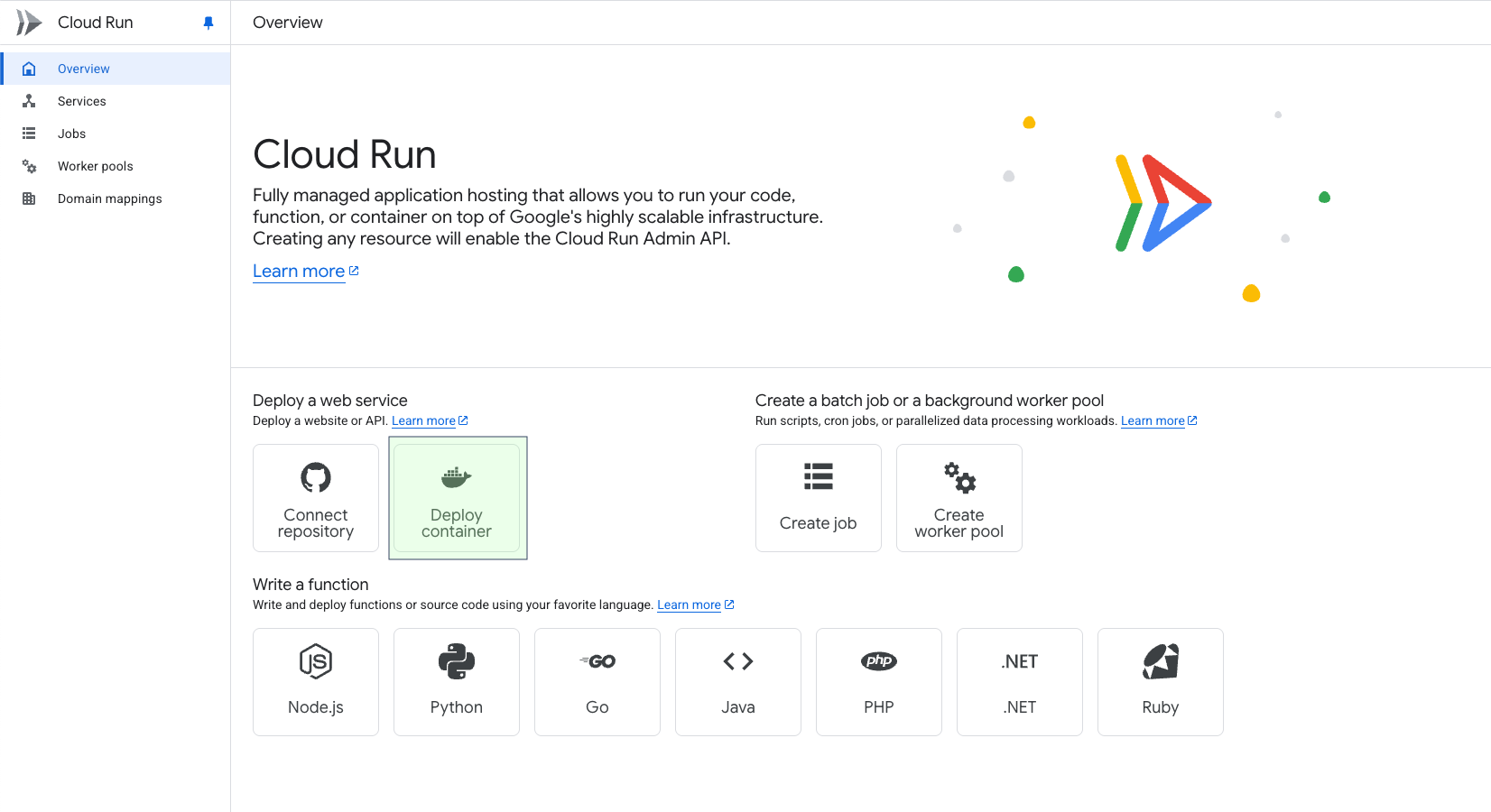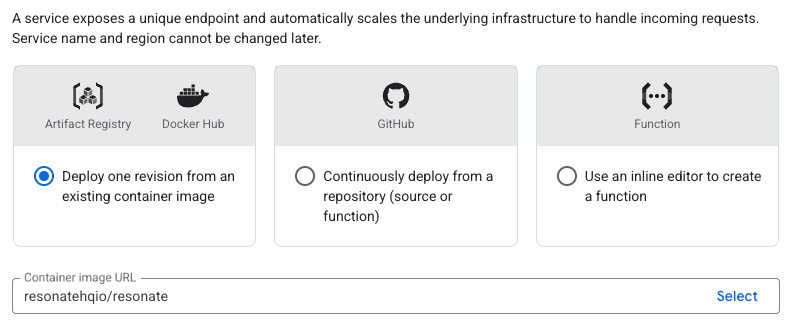Run a server
This page will help you install and run the Resonate Server.
First install the Server on your machine.
Install with Homebrew
You can install the latest Resonate Server version with Homebrew via:
brew install resonatehq/tap/resonate
All available releases and associated release artifacts are available on Github.
Once installed, you can start the server with an in-memory store by running:
resonate dev
Or, you can run the server with the default SQLite store by running:
resonate serve
You will see log output like the following:
time=2025-09-09T20:54:31.349-06:00 level=INFO msg="starting http server" addr=:8001
time=2025-09-09T20:54:31.349-06:00 level=INFO msg="starting poll server" addr=:8002
time=2025-09-09T20:54:31.349-06:00 level=INFO msg="starting grpc server" addr=:50051
time=2025-09-09T20:54:31.351-06:00 level=INFO msg="starting metrics server" addr=:9090
The output indicates that the server has HTTP endpoints available at port 8001, a polling endpoint at port 8002, a gRPC endpoint at port 50051, and a metrics endpoint at port 9090.
These are the default ports and can be changed via configuration.
Run with Docker
The Resonate Server repository contains a Dockerfile that you can use to build and run the server in a Docker container. You can also clone the repository and start the server using Docker Compose:
git clone https://github.com/resonatehq/resonate
cd resonate
docker-compose up
Deploy to GCP Cloud Run
To deploy an instance of the Resonate Server to Google Cloud Run, start by deploying a new service. Select "Deploy container" from the Cloud Run dashboard.

On the configuration screen, select "Deploy one revision from an existing container image".
And then, in the "Container image URL" field, enter the following image URL:
resonatehqio/resonate

Set the "Container port" to "8001", which is the default port for the Resonate Server's HTTP API.
And ensure that there is just 1 instance of the server running. Use "Manual scaling" and set "Number of instances" to "1".
You should be able to customize the rest of the settings as needed for your deployment.
Build from source
If you don't have Homebrew, we recommend building from source using Go. Run the following commands to download the repository and build the server:
git clone https://github.com/resonatehq/resonate
cd resonate
go build -o resonate
After it is built, you can compile and run it as a Go program using the following command:
go run main.go serve
Or, you can run it as an executable using the following command:
./resonate server
Customize configuration
The Resonate Server is highly configurable.
You can configure the server using a configuration file or via command flags.
./resonate serve --config resonate.yml
Command flags will override settings in the configuration file.
Run resonate serve --help for a full list of available options.
For production deployments, we recommend using a configuration file.
At the top level, the file supports five keys:
system: Controls core scheduling behavior.api: Configures external interfaces.aio: Configures asynchronous I/O subsystems.metricsAddr: Prometheus metrics bind address (default :9090).logLevel: One of debug, info, warn, error (default info).
Here is a resonate.yml file that explicitly sets every option to the server's built-in defaults.
Using this file is equivalent to starting Resonate with no configuration file.
See the config key reference for details on each section.
system:
url: http://localhost:8001
coroutineMaxSize: 1000
submissionBatchSize: 1000
completionBatchSize: 1000
promiseBatchSize: 100
scheduleBatchSize: 100
taskBatchSize: 100
taskEnqueueDelay: 10s
signalTimeout: 1s
api:
size: 1000
subsystems:
http:
enable: true
config:
addr: ":8001"
auth: {}
cors:
allowOrigin: []
timeout: 10s
taskFrequency: 1m
grpc:
enable: true
config:
addr: ":50051"
aio:
size: 1000
subsystems:
echo:
enable: false
config:
size: 100
batchSize: 100
workers: 1
router:
enable: true
config:
size: 100
workers: 1
sources:
- name: default
type: tag
data: { "key": "resonate:invoke" }
sender:
enable: true
config:
size: 100
plugin:
http:
enable: true
config:
size: 100
workers: 1
timeout: 1s
poll:
enable: true
config:
size: 100
bufferSize: 100
maxConnections: 1000
addr: ":8002"
cors:
allowOrigin: []
timeout: 10s
auth: {}
targets:
- name: default
type: poll
data: { "cast": "any", "group": "default" }
store-postgres:
enable: false
config:
size: 1000
batchSize: 1000
workers: 1
host: localhost
port: "5432"
username: ""
password: ""
database: resonate
query: {}
txTimeout: 10s
reset: false
store-sqlite:
enable: true
config:
size: 1000
batchSize: 1000
path: resonate.db
txTimeout: 10s
reset: false
metricsAddr: ":9090"
logLevel: info
You can customize the configuration by supplying only the keys you want to change.
For example, if you want to use PostgreSQL as the database instead of the default SQLite:
# resonate.yml
aio:
subsystems:
store-postgres:
enable: true
config:
host: db.example.com
port: "5432"
username: resonate
password: secret
database: resonate
Or, just customize the connection ports, metrics port, and auth credentials:
# resonate.yml
metricsAddr: ":9090" # custom metrics port
system:
url: "https://<your-domain>:8001" # custom system URL, port is external store
api:
subsystems:
http:
config:
addr: ":8001" # custom HTTP port
auth:
{ app_id }: { password } # HTTP basic auth credentials
grpc:
config:
addr: ":50051" # custom gRPC port
aio:
subsystems:
sender:
config:
plugins:
poll:
config:
addr: ":8002" # custom poller plugin port
auth:
{ username }: { password } # poller plugin auth
Run on Kubernetes
The recommended Kubernetes deployment strategy is a deployment. The easiest way to do this is with the yaml manifest below:
---
apiVersion: v1
kind: Service
metadata:
name: resonate
spec:
selector:
app: resonate
ports:
- port: 8001
name: api
---
apiVersion: apps/v1
kind: Deployment
metadata:
name: resonate
spec:
replicas: 1
selector:
matchLabels:
app: resonate
template:
metadata:
labels:
app: resonate
spec:
containers:
- name: resonate
image: ghcr.io/resonatehq/resonate:v0.5.0
args:
- "serve"
- "--aio-store=postgres"
- "--aio-store-postgres-host=HOST"
- "--aio-store-postgres-port=PORT"
- "--aio-store-postgres-username=USERNAME"
- "--aio-store-postgres-password=SECRET"
- "--aio-store-postgres-database=DBNAME"
ports:
- name: api
containerPort: 8001
Create a file named resonate.yml and apply the above YAML manifest.
kubectl apply -f resonate.yml
Finally, cleanup and remove resonate from your Kubernetes cluster.
kubectl delete -f resonate.yml
Config key reference
System Section
| Key | Type | Default | Description |
|---|---|---|---|
| url | string | — | Resonate server URL |
| coroutineMaxSize | int | 1000 | Maximum concurrent coroutines |
| submissionBatchSize | int | 1000 | Max submissions per tick |
| completionBatchSize | int | 1000 | Max completions per tick |
| promiseBatchSize | int | 100 | Promises processed per iteration |
| scheduleBatchSize | int | 100 | Schedules processed per iteration |
| taskBatchSize | int | 100 | Tasks processed per iteration |
| taskEnqueueDelay | duration | 10s | Delay before re-enqueueing tasks |
| signalTimeout | duration | 1s | Wait time for API/AIO signals |
API Section
| Key | Type | Default | Description |
|---|---|---|---|
| size | int | 1000 | Submission channel buffer size |
| subsystems.http.enable | bool | true | Enable HTTP API |
| subsystems.grpc.enable | bool | true | Enable gRPC API (disabled in minimal examples) |
HTTP Subsystem
| Key | Type | Default | Description |
|---|---|---|---|
| addr | string | :8001 | HTTP listen address |
| auth | map | — | Basic auth user/pass pairs |
| cors.allowOrigin | []string | — | Allowed origins for CORS |
| timeout | duration | 10s | Graceful shutdown timeout |
| taskFrequency | duration | 1m | Default task frequency |
gRPC Subsystem
| Key | Type | Default | Description |
|---|---|---|---|
| addr | string | :50051 | gRPC listen address |
AIO Section
| Key | Type | Default | Description |
|---|---|---|---|
| size | int | 1000 | Completion channel buffer size |
| subsystems.echo.enable | bool | false | Echo subsystem |
| subsystems.router.enable | bool | true | Router subsystem |
| subsystems.sender.enable | bool | true | Sender subsystem |
| subsystems.store-postgres.enable | bool | false | Postgres store |
| subsystems.store-sqlite.enable | bool | true | SQLite store |
Echo Subsystem
| Key | Default | Description |
|---|---|---|
| size | 100 | Submission channel size |
| batchSize | 100 | Max submissions per iteration |
| workers | 1 | Number of workers |
Router Subsystem
| Key | Default | Description |
|---|---|---|
| size | 100 | Submission channel size |
| workers | 1 | Number of workers |
| sources | [] | Routing sources; default adds tag resonate:invoke |
Sender Subsystem
| Key | Default | Description |
|---|---|---|
| size | 100 | Submission channel size |
| plugin.http.enable | true | HTTP plugin |
| plugin.poll.enable | true | Poll plugin |
| targets | list | Delivery targets (default poll with group default) |
HTTP Plugin
| Key | Default | Description |
|---|---|---|
| size | 100 | Message buffer size |
| workers | 1 | Worker count |
| timeout | 1s | Request timeout |
Poll Plugin
| Key | Default | Description |
|---|---|---|
| size | 100 | Message buffer size |
| bufferSize | 100 | Connection buffer size |
| maxConnections | 1000 | Max client connections |
| addr | :8002 | HTTP server address |
| cors.allowOrigin | [] | Allowed origins |
| timeout | 10s | Shutdown timeout |
| auth | map | Basic auth pairs |
SQLite Store
| Key | Default | Description |
|---|---|---|
| size | 1000 | Submission channel size |
| batchSize | 1000 | Max submissions per iteration |
| path | resonate.db | DB file path (:memory: for in‑memory DST) |
| txTimeout | 10s | Transaction timeout |
| reset | false | Drop database on shutdown |
PostgreSQL Store
| Key | Default | Description |
|---|---|---|
| size | 1000 | Submission channel size |
| batchSize | 1000 | Max submissions per iteration |
| workers | 1 | Worker count |
| host | localhost | DB host |
| port | 5432 | DB port |
| username / password | — | Credentials |
| database | resonate | DB name (resonate_dst in DST) |
| query | Additional query parameters (e.g., sslmode) | |
| txTimeout | 10s | Transaction timeout |
| reset | false | Drop database on shutdown |